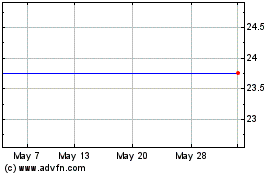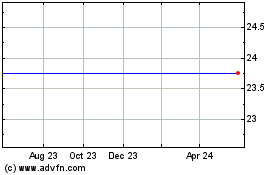Nautilus Nautilus Minerals Discovers More High Grade Systems in Tonga
02 November 2012 - 1:12AM
UK Regulatory
TIDMNUS
Nautilus Minerals Discovers More High Grade Systems in Tonga
FOR: NAUTILUS MINERALS INC.
TSX SYMBOL: NUS
OTCQX SYMBOL: NUSMF
AIM SYMBOL: NUS
November 1, 2012
Nautilus Minerals Discovers More High Grade Systems in Tonga
TORONTO, ONTARIO--(Marketwire - Nov. 1, 2012) - Nautilus Minerals Inc. (TSX:NUS)(OTXQC:NUSMF)(AIM:NUS) (the
"Company" or "Nautilus Minerals") is pleased to announce the discovery of two (2), high grade, Seafloor Massive
Sulfide ("SMS") systems on its wholly owned exploration tenements in the territorial waters of the Kingdom of
Tonga ("Tonga").
Grab samples from these discoveries assayed up to 11.9% copper, 59.8% zinc, 28.6 g/t gold and 673 g/t silver.
Mike Johnston, Nautilus Minerals' CEO commented, "These discoveries further highlight the prospectivity of our
Tongan exploration tenements, particularly the high precious metal grades we continue to encounter in the NE
Lau Basin. They will be added to the 17 SMS systems, as previously reported on our Tongan prospecting
licenses(i), which are being considered for further evaluation."
The SMS systems were sampled during an 18 day marine scientific research cruise between the 9th and 26th of
September 2012. The samples were collected as a part of a broader research effort in the NE Lau Basin.
Links:
Figure 1: http://www.nautilusminerals.com/i/map/PR_Tonga_NELauBasin_Sept12.png
Figure 2: http://www.nautilusminerals.com/i/map/PR_Tonga_FonualeiSamples.png
Figure 3: http://www.nautilusminerals.com/i/map/PR_Tonga_NorthernMataSamples.png
(i) Jankowski 2012: "Nautilus Minerals Incorporated, NI43-101 Technical Report 2011, PNG, Tonga, Fiji, Solomon
Islands, New Zealand, Vanuatu and the ISA" http://www.nautilusminerals.com/i/pdf/NAT008_Nautilus_NI_43-
101_Technical_Report_2011.pdf
Summary of sampling program in NE Lau Basin, Tonga.
1. Fonualei South - Two separate chimney fields, containing high grade sulfide chimney structures were observed
and sampled on a large volcanic edifice which consisted of a mixture of some active but mostly inactive
chimneys generally up to approx. 4m high.
The water depth of Fonualei South 1 (Figure 2) is approx. 965 m. The upper limit of mineralised outcrop appears
to follow the bathymetry contour; however the lower boundary remains unmapped. Chimneys are densely packed into
clusters with dominant sulfide talus surrounding their bases.
At Fonualei South 2 (Figure 2) ROV observations confirm the presence of chimneys at a water depth of approx.
1550 m, interpreted from high resolution AUV bathymetry data collected in 2011. This system lies on relatively
flat terrain at the base of the Fonualei South volcanic edifice. Two tall black smoker chimneys were measured
at this site (25 - 30 m in height). A single sample of chimney talus with exceptional zinc and gold values was
collected at the base of a tall chimney (Sample 25113). The outcropping mineralisation was not mapped to its
full extent in any direction.
/T/
Table 1. Final assay results of sulfide bearing samples for Fonualei South
(1)
=---------------------------------------------------------------------------
East- North-
Sample Sample Weight Cu Zn Au Ag ing ing Depth Lith-
No Type (g) (%) (%) (g/t) (g/t) (2) (2) (2) ology
=---------------------------------------------------------------------------
25113 Chimney 760 0.866 59.800 28.60 673 758316 8059583 -1570 Massive
Sulfide
=---------------------------------------------------------------------------
25114 Chimney 520 4.490 5.650 3.78 31 757294 8058791 -975 Massive
Sulfide
=---------------------------------------------------------------------------
25115 Chimney 1100 3.780 43.500 12.90 556 757262 8056949 -964 Massive
Sulfide
=---------------------------------------------------------------------------
Minimum 0.9 5.6 3.8 31
--------------------------------
Maximum 4.5 59.8 28.6 673
--------------------------------
Average 3.0 36.3 15.1 420
--------------------------------
(1) Results received from ALS Laboratory
(2) UTM WGS84 Zone 1 South
/T/
2. North Mata - Two separate chimney fields, containing high grade sulfide chimney structures, were observed
and sampled on sub-parallel volcanic edifices.
Mata Ua chimney field was observed and sampled on the north western flank of the southern volcanic edifice, at
a water depth of approx. 2360 m (Figure 3). There is copious chimney talus above and below the chimney field
containing active black smokers, on a reasonably steep slope. The outcropping mineralisation was not mapped to
its full extent; it remains open along strike to the NE and SW.
The Mata Tolu chimneys were first observed in a camera tow in 2010. The recent ROV observations and sampling
confirmed the existence of a chimney field, at a water depth of 1820 m, on the summit of the volcanic edifice.
A significant quantity of chimney talus was observed at the base of chimney clusters within the chimney field.
The outcropping mineralisation was not mapped to its full extent in any direction.
/T/
Table 2. Final assay results of sulfide bearing samples for North Mata(1)
=---------------------------------------------------------------------------
East- North-
Sample Sample Weight Cu Zn Au Ag ing ing Depth Lith-
No Type (g) (%) (%) (g/t) (g/t) (2) (2) (2) ology
=---------------------------------------------------------------------------
25117 Chimney 250 11.900 6.510 10.25 112 845421 8337243 -2365 Massive
Sulfide
=---------------------------------------------------------------------------
25124 Chimney 550 0.947 3.070 10.95 82 844818 8338666 -1824 Semi-
massive
Sulfide
=---------------------------------------------------------------------------
25125 Chimney 2380 0.286 11.300 9.78 134 844858 8338615 -1820 Semi-
massive
Sulfide
=---------------------------------------------------------------------------
25126 Chimney 160 3.660 0.878 5.09 37 844877 8338671 -1840 Semi-
massive
Sulfide
=---------------------------------------------------------------------------
25128 Altered 160 1.185 0.694 9.94 34 844853 8338624 -1821 Altered
Volcanic Volcanic
=---------------------------------------------------------------------------
Min 0.3 0.7 5.1 34
--------------------------------
Max 11.9 11.3 11.0 134
--------------------------------
Average 3.6 4.5 9.2 79.8
--------------------------------
(1) Results received from ALS Laboratory
(2) UTM WGS84 Zone 1 South
/T/
Summary of Procedures
The target testing and sampling work described herein was completed using a Quest 4000 Remotely Operated
Vehicle (ROV) equipped with various video cameras and a forward looking sonar to identify seafloor features
ahead and to the sides of the ROV, in real time.
For seafloor sampling the ROV was equipped with two manipulator arms and a custom-built sample tray, or
"geobox", for storing up to 10 hand-sized grab samples or scoop samples.
1 Target Testing Procedure
Outcropping sulfide mineralisation at each of the four sites was observed using the ROV during target testing
traverses. The planned traverses are generally based on features observed in detailed bathymetry maps,
augmented by plume hunting data and previous camera tows where possible. When chimney structures are located,
using a combination of video and sonar equipment, that area is mapped in greater detail with the ROV and ROV
grab samples are collected.
No equipment capable of mapping any mineralisation beneath the seafloor was available on the ROV.
2 Sampling Procedure
Chimney and altered volcanic rock samples averaging 735 g (from 160 g to 1100 g) were collected using the ROV
manipulator arm, and then placed in a separate sample cage for recovery to the ship and processing on deck.
Relatively fresh chimney samples were collected in a representative part of each field. Nautilus Minerals
received a portion of each sulfide- bearing ROV grab sample, the assays of which are the material substance of
this release.
Small volcanic samples, which are not material to this release, were also collected using the ROV manipulator
arm and placed in the sample box attached to the ROV. The assay results for these un-mineralised volcanic
samples are under the custodianship of the collaborating scientists and not yet available for publication.
3 Laboratory Analysis
All analysis was carried out by ALS Laboratory Group in Brisbane, Australia. ALS operates quality systems based
on international standards ISO/IEC17025:1999 "General requirements for the competence of calibration and
testing laboratories" and ISO9001:2000 "Quality Management Systems - Requirements".
Samples were crushed, split and weighed in preparation for analysis via Inductively Coupled Plasma Mass
Spectrometry (ICP-MS), Atomic absorption spectroscopy (AAS), and Inductively Coupled Plasma Atomic Emission
Spectroscopy (ICP-AES). In addition to the ALS internal standards, duplicates and blanks, Nautilus Minerals
included appropriate standards and a duplicate for analysis.
Qualified Person
The exploration results reported in this press release have been compiled under the supervision of Jonathan
Lowe, Exploration Manager of Nautilus Minerals. Mr Lowe is a Fellow and Chartered Professional of the
Australasian Institute of Mining and Metallurgy, has over 17 years experience in exploration geology, and is a
qualified person as defined by National Instrument 43-101. He has read and approved the technical disclosure in
this release.
For more information please refer to www.nautilusminerals.com.
Certain of the statements made in this news release may contain forward-looking statements within the meaning
of the United States Securities Exchange Act of 1934 and forward-looking information within the meaning of
applicable Canadian securities law. Forward-looking statements and forward-looking information include, but are
not limited to statements or information with respect to the ore resources of the company. We have made
numerous assumptions about the material forward-looking statements and information contained herein. Please
refer to the company's most recently filed Annual Information Form in respect of material assumptions and risks
relevant to forward looking information. Even though our management believes the assumptions made and the
expectations represented by such statements or information are reasonable, there can be no assurance that the
forward-looking statement or information will prove to be accurate. Forward-looking statements and information
by their nature involve known and unknown risks, uncertainties and other factors which may cause the actual
results to be materially different from any future results expressed or implied by such forward-looking
statements or information. Such risks, uncertainties and other factors include, among others, the risk that the
amount of metals contained in the company's deposits may differ from estimates of resources. Should one or more
of these risks, uncertainties or other factors materialize, or should underlying assumptions prove incorrect,
actual results may vary materially from those described in forward-looking statements and information. Although
we have attempted to identify factors that would cause actual results to differ materially from those described
in forward-looking statements and information, there may be other factors that cause actual results,
performances, achievements or events to not be as anticipated, estimated or intended. Also, many of the factors
are beyond our control. There can be no assurance that forward-looking statements or information will prove to
be accurate, as actual results and future events could differ materially from those anticipated in such
statements. Accordingly you should not place undue reliance on forward-looking statements or information.
Except as required by law, we do not expect to update forward-looking statements and information as conditions
change and you are referred to the full discussion of the Company's business contained in the Company's reports
filed with the securities regulatory authorities in Canada.
About Nautilus Minerals Inc.
Nautilus is the first company to explore the ocean floor for polymetallic seafloor massive sulphide deposits
and is developing its first project at Solwara 1, in the territorial waters of Papua New Guinea, where it is
aiming to produce copper, gold and silver. The company has been granted all necessary environmental and mining
permits.
Nautilus also holds more than 500,000 km2 of highly prospective exploration acreage in the western Pacific; in
PNG, the Solomon Islands, Fiji, Vanuatu and Tonga, as well as in international waters in the eastern Pacific.
A Canadian registered company, Nautilus is listed on the TSX:NUS and AIM:NUS stock exchanges and OTCQX:NUSMF.
Its corporate office is in Brisbane, Australia. Its major shareholders include Metalloinvest, the largest iron
ore producer in Europe and the CIS, which has a 21% holding, global mining group Anglo American, which holds an
11.1% interest and MB Holdings, an Oman based group with interests in mining, oil & gas, which holds a 16.9%
interest.
-30-
FOR FURTHER INFORMATION PLEASE CONTACT:
Nautilus Minerals Inc. (Toronto)
Investor Relations
+1 (416) 551 1100
investor@nautilusminerals.com
www.nautilusminerals.com
OR
Numis Securities Limited
Nominated adviser: Alastair Stratton/Stuart Skinner
Corporate broking: James Black
+ 44(0) 20 7260 1000
OR
Dahlman Rose & Co., LLC
Christopher R. Weekes
1301 Avenue of the America's
New York, NY 10019
Direct: +1 212 372 5766
Neither the TSX, London Stock Exchange, nor the OTCQX accepts responsibility for the adequacy or accuracy of
this press release.
Nautilus Minerals Inc.
Nautilus Minerals (LSE:NUS)
Historical Stock Chart
From Dec 2024 to Jan 2025

Nautilus Minerals (LSE:NUS)
Historical Stock Chart
From Jan 2024 to Jan 2025
